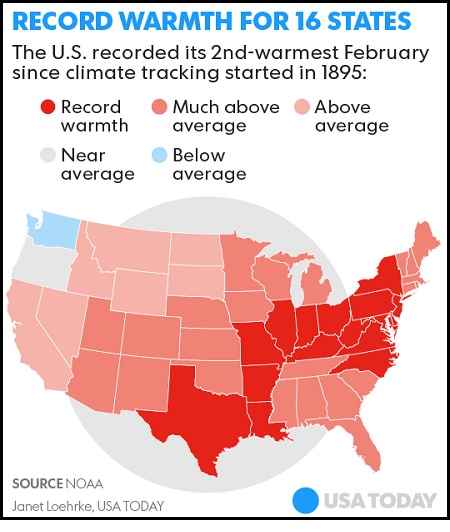
|
|

|
|
| April 19, 2024 |
|
Winter defies weather records; Spring gets a jump start 
Our planet sizzled to its second-warmest winter on record, according to federal scientists.
The global temperature for the months of December, January and February soared to 1.6 degrees above average this winter, according to National Oceanic and Atmospheric Administration data. That's a huge amount in climate science, where records are often broken by hundredths or tenths of degrees. Still, this winter was nowhere close to the 2015-16 winter record, when the planet sweltered to a tremendous 2 degrees above average. Last month also marked the second-warmest February on record for the planet, trailing only 2016, NOAA said. It became the 41st consecutive February and the 386th consecutive month with above-average temperatures. The most recent cooler-than-average month dates back to July 1985. NOAA's global climate records began in 1880. Separate analyses of global temperatures from NASA and the Japan Meteorological Center, concurred with NOAA's assessment. The latest data is not unexpected. The past three years — 2014, 2015 and 2016 — each set warm records for the globe, according to NASA. Much of the U.S., southeastern Canada and most of central and eastern Russia experienced the most intense warmth this February. NOAA reported earlier that the U.S. broiled to its second-warmest February on record. The poles also experienced extreme warmth: Arctic sea ice in February melted to 455,600 square miles below average, the smallest area for that month since records began in 1979. That's 15,400 square miles less than the previous record set just last year, according to an analysis by the National Snow and Ice Data Center. Antarctic sea ice also tallied a February record low, the data center said. Story Date: March 20, 2017
|